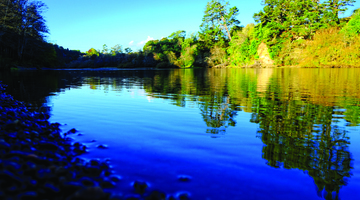Hoturoa Kerr shares stories about his personal connection to the river through his name, the significance of the river and childhood memories of bombing off the bridge and playing in the river. Hoturoa was raised in the Waikato region and has a wealth of knowledge, particularly in the practice of waka, Waikato-Tainui history, kawa and tikanga.
Transcript
HOTUROA KERR
For me, the river and my first connection to it was probably – it’s a memory that I don’t have but it’s a memory that I have because it’s something that’s been told to me, and that memory is around my father telling me that, not long after I was born, I was taken down to the awa, and him and a couple of other people did the tohi for me down at the river when I was still pretty new to this world, and so I guess that’s the connectivity I suppose that’s where it is is from that.
As years have gone on, I suppose the other connection point I suppose, is because of my name and because of the waka tradition and history of our people, it has always kept me connected to the practical applications of our mahi on the river. So there’s a few connections, but I suppose those are the big ones, firstly through my father doing what he did not long after I was born and the second one being that, I guess, historical connection to the waka mahi of our people.
With the tohi, originally – there’s lots of old stories, so yeah we could get people to go and if they look back at stories about Tawhaki – one of the processes that Tawhaki had to go through in order to legitimise the birth of one of his children was actually by going through – taking that child through a tohi, right, same as with Māui. Māui was the same thing. In his case, it was actually a tohi right conducted by his father to legitimise his position within the world. But for me, I guess it’s just something that was not so much a legitimising of me as an individual in our… in the world as such, but I think it’s just to say that part of the deep-rooted psyche of our people runs with the current of the river.
There’s a whole lot of aspects of the river that are important in a wairua sort of a way and in a secular way I suppose, and we just have to understand that for different parts of how we live. You know, it is good fun doing bombs off the bridge and stuff like that because I did all that when I was – you know, I think I jumped off the train bridge when I was about 9, 8 or 9 or something like that, that was a big deal, swimming across the river when I was about 7 or so, that was a big deal. But I think for many people, I don’t know if it happens so much now, but a lot of times, even when I was teenager and getting… growing into my 20s and that, often when there were any, any kind of issues or any kind of problems or even sometimes illnesses and sicknesses that people had, there would always be talk about going down to the river and using the river as a point of reference to begin healing.
As we’ve been going now and as there’s lots more importance in terms of resourcing our iwi and how we talk about the river being a reflection, not just of the mana of our people but the mana of Te Atairangikaahu and the mana of Kīngi Tūheitia, I thought it was important that our wakas especially Taheretikitiki and the other wakas – if they want to do that, that’s fine – and I think a co-operative sort of way of doing this is the important way, because I think the river, we have a genealogical and historical link that goes back centuries with our river but that doesn’t exclude all the people that are here with us, that live around here today, and I think we need to try and find ways of including them in the processes of keeping our river clean, keeping our river healthy and making the best combined use of the river, notwithstanding our own belief that the river is ours and it will always be ours, but we are quite happy to share that taonga with people who are happy to come and help us look after it.
Acknowledgements:
Hoturoa Kerr
The Waikato Tainui College for Research and Development acknowledges the financial support given by the Waikato River Cleanup Trust Fund which is administered by the Waikato River Authority.
The Waikato River Cleanup Trust does not necessarily endorse or support the content of the publication in any way.



